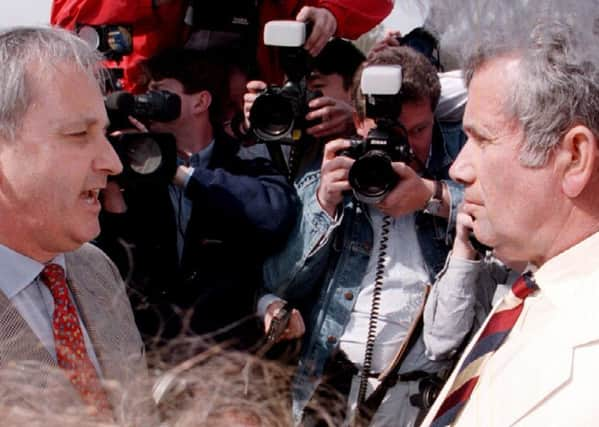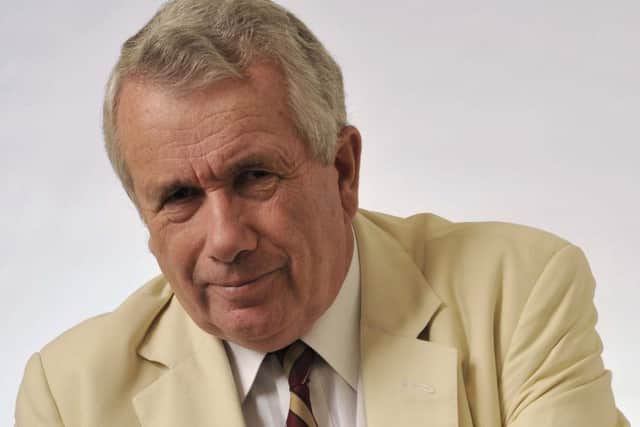Martin Bell - from war zones to Westminster


Next month it will be 20 years since former war correspondent Martin Bell became MP for Tatton after defeating Neil Hamilton.
In a General Election that transformed the political landscape, sweeping Tony Blair to power on a wave of public euphoria, Bell’s victory was no less seismic.
Advertisement
Hide AdAdvertisement
Hide AdHe stole the show in the 1997 election campaign with his anti-sleaze battle against Hamilton winning what was at the time the fourth safest Tory seat in the country with a majority of more than 11,000.


However, when Bell stepped down as an independent MP four years later (as he promised he would) he did so disillusioned by the machinations of Westminster. “I found the House of Commons one of the most shocking places I’d ever been to,” he says.
“Most politicians at some point have entertained the ambition of being an MP because it attracts ambitious people. But I wasn’t ready for it, having never planned to be an MP.”
As an outsider, though, he gained an insight into the inner sanctum of Parliament. “I made some very good friends there and some of the old hands there told me it used to be much more raucous before the television cameras arrived and that they’d actually quietened things down, so imagine what it was like before.
Advertisement
Hide AdAdvertisement
Hide Ad“What got to me was the evident willingness of MPs to vote for measures they didn’t believe in and against measures they did. I was very lucky because I was my own chief whip.”


It’s something Bell covers in his forthcoming book War and The Death of News: Reflections of a Grade B Reporter, published in June, which he will be discussing later this month when he appears at The Yorkshire Post Literary Lunch in Harrogate. In a journalism career spanning more than four decades he became one of the BBC’s most recognisable TV correspondents and was affectionately known as the ‘Man in the White Suit’, twice scooping the Reporter of the Year award.
He made his name in Vietnam in the 1960s, and also covered wars in the Middle East, Rwanda and Bosnia –where he was wounded by shrapnel.
Bell wrote his latest book after stumbling across a box in his attic crammed with notes and scripts dating back to when he first joined the BBC in 1962. It was the trigger for his reflections on reportage and how it has changed over the years. “There was never a golden age of news but there was an age that was more authentic than it is now.”
Advertisement
Hide AdAdvertisement
Hide AdHe feels there’s much less eye-witness reporting today. “There are far fewer foreign correspondents and to some extent journalism has turned into a celebrity chronicle, even amongst the serious newspapers. There’s an awful lot of space given over to the Kardashian family, shall we say, and the equivalent didn’t happen 30 or 40 years ago.”
If news reporting has changed over the years then so, too, has politics and it’s ironic that 20 years after Tatton found itself in the news headlines, the Cheshire constituency is once again in the spotlight after its current MP George Osborne became editor of the London Evening Standard.
“He’s a clever guy there’s no doubt about that, but I don’t think it’s possible to do the two jobs because you’ll be short-changing somebody, or you’ll end up with conflicts of interest,” says Bell.
“Is he speaking for London or is he speaking for his Cheshire constituents? If his newspaper unearthed some scandal in the BlackRock company he advises what would he do then? It seems fraught to me.
Advertisement
Hide AdAdvertisement
Hide Ad“If he’s going to go ahead with this, the sensible course is to take the ‘Chiltern Hundreds’ and fight a by-election so that he can have the approval of his constituents, but he’s not going to do that.”
One thing this has done is rekindle the debate surrounding MPs and whether they should take second jobs. But Bell is wary of taking a draconian stance on the issue.
“I think Parliament needs to attract people that have achieved success in other walks of life. I wrote columns for local newspapers during the four years I was an MP but it didn’t effect my constituency work... but editing a newspaper is altogether different.”
He is concerned, though, by what he sees as the growing number of career politicians. “What has happened in the last 50 years is the growth of a political class. A P Herbert, a former independent MP, said he looked around him in the House (of Commons) and whatever subject came up, whether it was coal mining, the railways, or law reform, there was somebody who had worked in that trade or profession.
Advertisement
Hide AdAdvertisement
Hide Ad“What we now have are very clever people from very similar universities who get a job as a political advisor or work in a party’s research department. If they’re lucky, before they’re 30 they’ll land themselves a safe seat without ever having what Denis Healey called ‘hinterland’ and they have nothing to bring to the table except ambition.”
He finds this a worrying trait. “There are now very few MPs with any military experience. Whereas Lord Carrington once told me that when he was Margaret Thatcher’s Defence Secretary every single member of her cabinet, except Mrs Thatcher herself, had served in uniform in the Second World War. So there’s a lot of institutional experience that we don’t have any more.”
After leaving the House of Commons Bell was appointed by UNICEF UK as Goodwill Ambassador for Humanitarian Emergencies, a role that took him back to some of the countries he once covered as a foreign correspondent.
Then in 2004, he stood as an independent for the European Parliament but failed to win a seat.
Advertisement
Hide AdAdvertisement
Hide AdMore than a decade on, and despite his wealth of experience, he has no intention of returning to the political fray. “I’m 78 and I’ve been on the losing side too often. I was in favour of the alternative vote and reforming our politics and that lost, and on Brexit I was a Remainer and they lost,” he says.
Bell carved out a reputation for straight talking and doesn’t sugar coat his concerns about what he regards as the direction of political discourse in this country. “I’m worried about what seems to be the rise of xenophobia and hate speech. This is not the Britain that I recognise.
“I think we’ve been extraordinarily lucky in the last 70 years but I do worry about Europe fragmenting into competing nations. I fear that we’re hanging over a cliff... I hope that I’m wrong.”
The Yorkshire Post Literary Lunch with Martin Bell takes place at the Cairn Hotel, Harrogate, on April 25, starting at noon. For more details log on to www.harrogateinternationalfestivals.com or call the box office on 01423 562 303. Tickets are £35 and the price includes wine on arrival, two-course lunch, plus tea or coffee.
A life in despatches
Advertisement
Hide AdAdvertisement
Hide AdMartin Bell joined the BBC in 1962 at the age of 24, with a first-class honours degree from King’s College, Cambridge, under his belt.
Over the next 30 years, he reported from 80 countries and covered 11 conflicts. He made his name in Vietnam in the 1960s, and also covered wars in Nigeria, Angola and Rwanda, as well as numerous assignments in Northern Ireland.
His sparse, uncompromising style of journalism won him the Royal Television Society’s Reporter of the Year award in 1977, and again in 1993. He was awarded an OBE in 1992.
He was badly wounded by shrapnel as he delivered a bulletin from Sarajevo, his “lucky” white suit letting him down for once.
In 1997 he became MP for Tatton, stepping down four years later.